The origins of Ubuntu trace back to Mark Shuttleworth's vision of creating a user-friendly and accessible Linux distribution. Inspired by the principles of open source software and the need for an operating system that could bridge the gap between the technical and non-technical users, Shuttleworth founded the Ubuntu project in 2004.
Ubuntu's primary goal was to provide a free and open-source alternative to proprietary operating systems like Microsoft Windows and macOS. It aimed to make Linux more approachable and usable for a wider audience, focusing on simplicity, ease of installation, and regular updates. The project adopted a strong commitment to open source values, community collaboration, and inclusiveness.
Ubuntu quickly gained popularity for its intuitive user interface, extensive hardware support, and comprehensive software ecosystem. It embraced the GNOME desktop environment and introduced the Ubuntu Software Center, a centralized application repository that simplified software installation and management for users.
One of the significant impacts of Ubuntu on the open source initiative was its role in popularizing Linux as a viable desktop operating system. Ubuntu's emphasis on user experience and accessibility attracted a broader user base, including non-technical users who may have been hesitant to try Linux in the past. Its success helped dispel the notion that Linux was only for experts or developers, thereby broadening the adoption of open source software.
Ubuntu's impact extended beyond the desktop and into server environments. With the Ubuntu Server Edition, Canonical focused on providing a secure and scalable platform for enterprise deployments. Ubuntu Server gained recognition for its stability, ease of administration, and strong community support. It became a preferred choice for many organizations, including web hosting providers, cloud computing platforms, and data centers.
Furthermore, Ubuntu's commitment to long-term support (LTS) versions, which are supported for five years, provided stability and reliability for businesses and institutions. This made Ubuntu an attractive option for those seeking a solid foundation for their infrastructure while still benefiting from the open source philosophy.
Looking to the future, Ubuntu continues to evolve and adapt to changing technological landscapes. Canonical, under Shuttleworth's leadership, remains committed to advancing Ubuntu as a platform for innovation. They actively collaborate with the open source community, developers, and industry partners to improve Ubuntu's capabilities, performance, and compatibility.
Ubuntu has also embraced new form factors and platforms. For instance, Ubuntu Touch was an ambitious project aimed at bringing Ubuntu to smartphones and tablets, providing a converged experience where a single device could function as a desktop computer when connected to a larger display. Although Ubuntu Touch faced challenges and ultimately shifted focus, the project demonstrated Ubuntu's versatility and commitment to exploring new possibilities.
Canonical has also expanded Ubuntu's reach to emerging technologies such as containers, microservices, and Internet of Things (IoT) devices. Ubuntu Core, a stripped-down version of Ubuntu tailored for IoT deployments, offers a secure and manageable operating system for connected devices.
In summary, Ubuntu's origins lie in Mark Shuttleworth's vision of creating an accessible and user-friendly Linux distribution. Its impact on the open source initiative has been significant, popularizing Linux as a desktop and server operating system while promoting open source values. Ubuntu's future lies in continued innovation, collaboration, and adaptability, as it embraces new technologies and expands its reach to diverse platforms and form factors.
The Wizard has been using Ubuntu and Ubuntu MATE for more than 12 years. I stopped using Windows at that time and have never used Windows, except at work since that time.
Source: Some or all of the content was generated using an AI language model


No comments:
Post a Comment
Contact The Wizard!
(he/him)